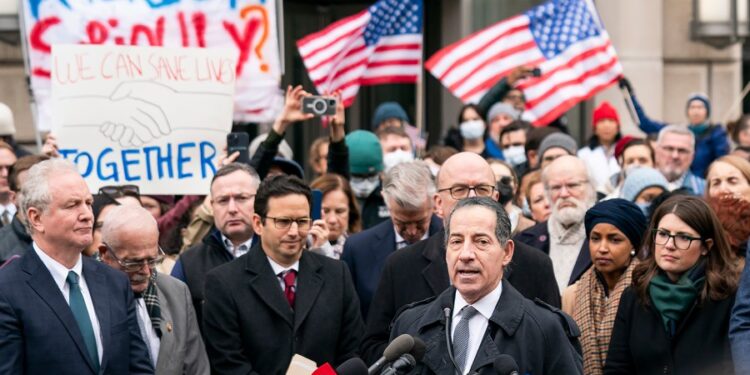
Lawmakers and legal experts are warning the Trump administration’s efforts to shutter the government’s foreign assistance agency is unconstitutional and is likely to face challenges in court.
Over the weekend, agents of the so-called Department of Government Efficiency (DOGE) entered the U.S. Agency for International Development (USAID) facility. Staff started getting shut out of internal systems Sunday and were told not to come into the headquarters at the Ronald Reagan Building on Monday.
Tesla and SpaceX CEO Elon Musk, who leads DOGE, said his team took a “wood chipper” to USAID over the weekend. He has for days railed against USAID on his social media platform X and levied accusations of corruption against the independent agency that has provided humanitarian and development assistance to countries around the world for more than 60 years.
“We don’t have a fourth branch of government called Elon Musk, and that’s going to become real clear,” said Rep. Jamie Raskin (D-Md.) at a press conference with other Democratic lawmakers outside USAID headquarters. “This illegal, unconstitutional interference with congressional power is threatening lives all over the world.”
During an event hosted on X early Monday morning, Musk said that USAID is a “ball of worms” that is “beyond repair,” and that the president agreed to shut it down. Secretary of State Marco Rubio said Monday that he had taken over as acting administrator of USAID amid speculation that Trump may try to merge the stripped-down agency into the State Department.
But while Trump may be able to make changes on the margins, as he has with his ban on diversity, equity and inclusion (DEI) initiatives across the federal government, lawmakers and legal experts argue that neither the president nor his agents can unilaterally do away with the agency.
“Musk, and perhaps Congress, need to recognize that this isn’t the same as a corporate takeover of another business. Since USAID is an independent agency, only an act of Congress can abolish it. Even shutting down the agency, but just leaving it on the books, should trigger legal challenges,” said James DeSimone, an employment and civil rights attorney at V. James DeSimone Law.
Critics have said that since President John F. Kennedy created USAID using an executive order in 1961, President Trump can do away with it via executive order. But that’s not the full story.
Congress later passed a law, the Foreign Affairs Reform and Restructuring Act of 1998, codifying USAID as an independent agency.
DeSimone also said career civil service employees are not the same as political appointees, who serve at the pleasure of the president and may be asked to resign or dismiss at any time.
“They have due process rights and legal protections designed to prevent such unlawful political retaliation,” DeSimone said. “And you cannot just put thousands of these people on leave without following federal regulations and providing notice. How long would they be on leave? Because long-term paid leave, without an end, is the same as illegal termination. Litigation is inevitable, even if Congress acts.”
Even personal services contractors, who are employed by USAID but don’t enjoy the legal protections of direct hires, have backstops built into their contracts. One USAID employee told The Hill that their contract requires 15 days of notice and a reason for terminating the contract.
Trump pushed back Monday on the argument that only an act of Congress action could dismantle USAID.
“I don’t think so. Not when it comes to fraud. If there’s fraud. Those people are lunatics. And, if it comes to fraud you wouldn’t have an act of Congress, and I’m not sure you would anyway,” Trump said.
While USAID is not an imperfect organization, experts told The Hill that the attacks levied by Musk and Trump against the agency were inaccurate.
“What I will say is that it’s not that the US assistance regime is perfect. I actually think claims that it’s very corrupt are wrong, there’s a lot of evidence pointing to very low rates of corruption in US assistance, but there are definitely things that could be done more efficiently,” said Charles Kenny, a senior fellow at the Center for Global Development.
Two other Center for Global Development fellows, Justin Sandefur and Rachel Bonnifield, also debunked one of Musk’s claims that only 10 percent of USAID money reaches its intended beneficiaries.
“This is a wildly incorrect and misleading interpretation of a different statistic—that 10 percent of USAID payments are made directly to organizations in the developing world. The remaining 90 percent includes all the goods and services that USAID, American companies, and faith-based organizations deliver in kind, from HIV drugs to emergency food aid, malaria bed nets, and treatment for acute malnutrition,” the fellows said in their analysis.
“And it is absolutely crucial to debunk this false claim because it is being used as part of the pretext to (illegally) dissolve USAID in its entirety.”







